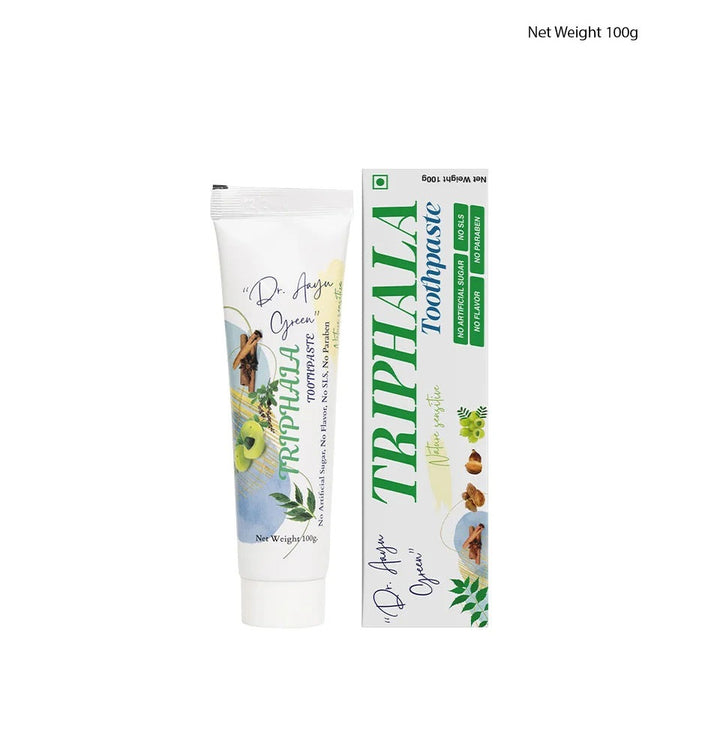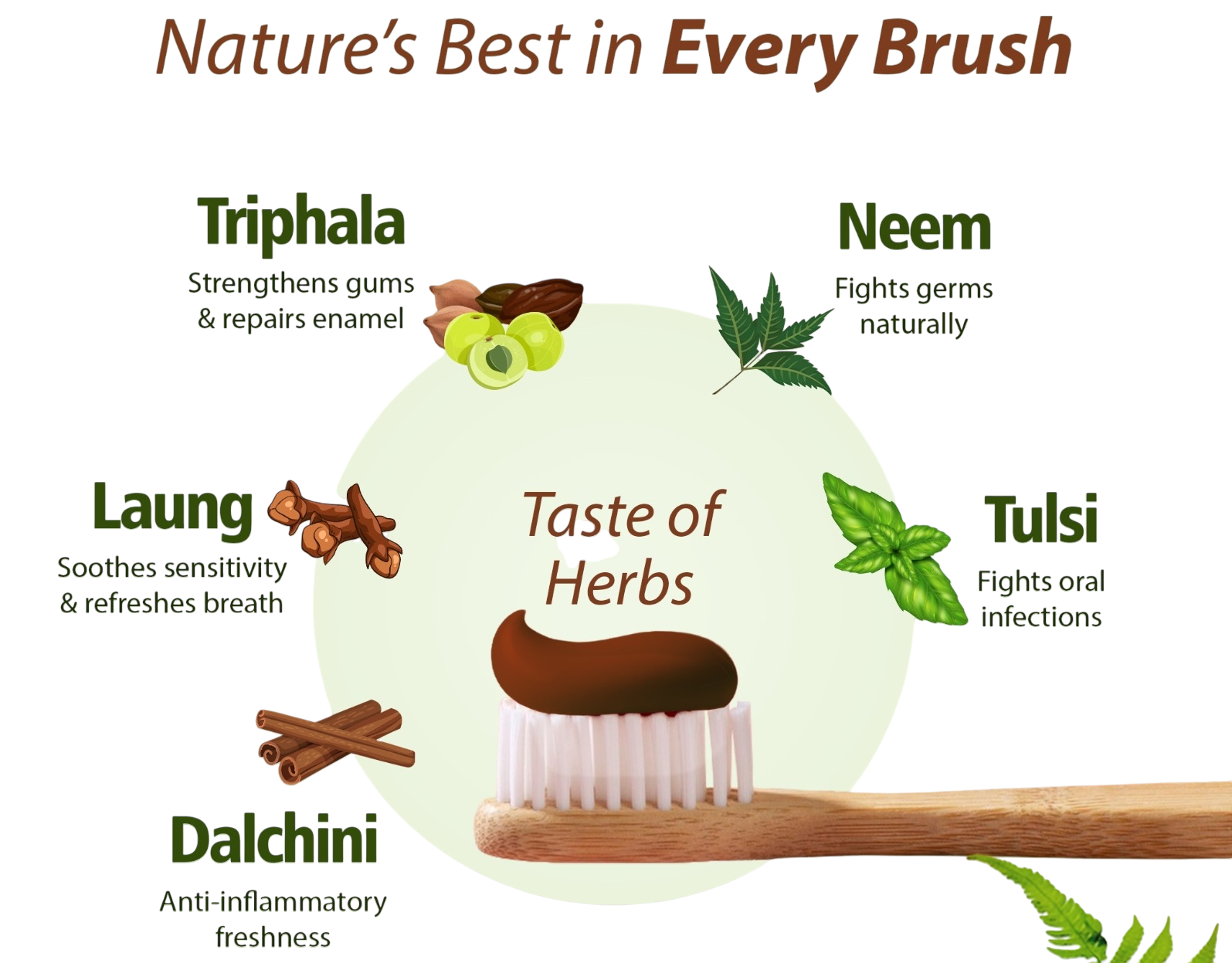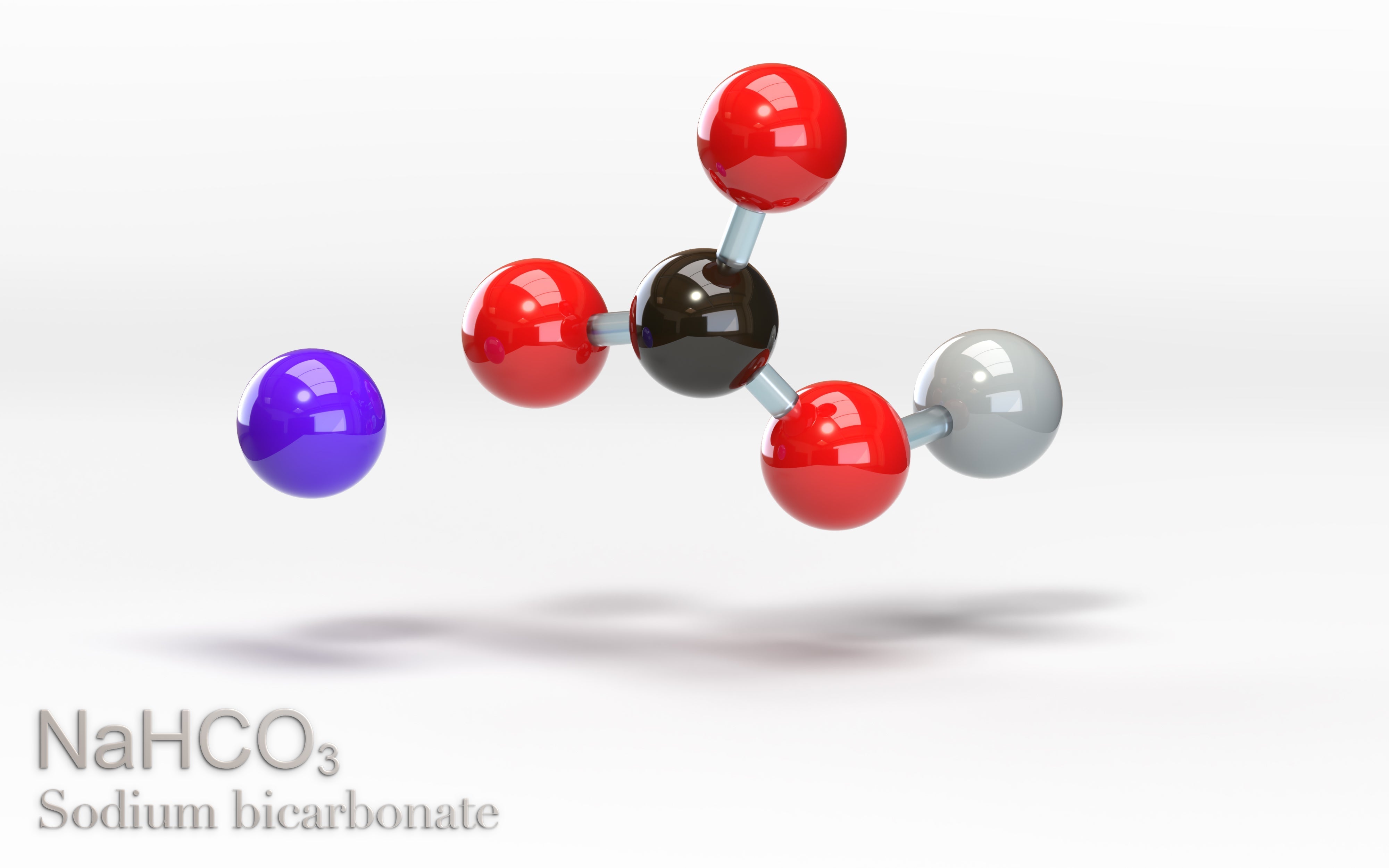Introduction
When it comes to oral health, we often focus on the teeth and forget the gums. Yet healthy gums are integral to a strong smile, fresh breath and overall well‑being. In fact, according to the ancient healing system of Ayurveda, the oral cavity is one of the most important gateways into our body: proper care of the gums is a vital part of maintaining whole‑body health.
In this blog we’ll explore how to maintain gum health by Ayurveda, detailing a daily oral hygiene Ayurvedic routine, key herbs and formulations (like the versatile Triphala), and specific ingredients like Neem, Pomegranate extract, and Miswak. You’ll also see how modern herbal toothpaste for gums can integrate these time‑tested remedies into your daily care.
Because at TickMyHealth, we believe in blending ancient wisdom with modern solutions, helping you care for your gums naturally, effectively and consistently.
Why Gum Health Matters: An Ayurvedic Perspective
In Ayurveda, the mouth is not just the entry point for food—it’s also a reflection of the body’s overall health. The gums, which support your teeth, are crucial for maintaining both oral and systemic health. In fact, gum health Ayurveda sees the condition of your gums as indicative of the state of your internal balance.
When gums are inflamed, bleed easily, or recede, it’s often a sign of imbalance in one of the three doshas (Vata, Pitta, Kapha). For example:
-
Excess Vata might lead to dry, inflamed, or receding gums.
-
Excess Pitta can cause gum redness, swelling, and bleeding.
-
Excess Kapha may lead to sluggish circulation and excess mucus around the gums.
By maintaining balance, Ayurveda offers solutions to prevent gum disease and inflammation.
Key Ayurvedic Herbs for Gum Health
Ayurveda’s approach to gum care is rooted in herbs and natural ingredients that are known to maintain gum health and promote overall oral hygiene. Here are some of the most effective herbs for gum health Ayurveda.
1. Miswak for Gums
Miswak, also known as Salvadora persica, is a natural tooth-cleaning twig used for centuries in Ayurveda and other traditional systems.
-
Benefit: Miswak is antimicrobial and helps fight plaque buildup while massaging the gums. It also has natural fluoride and astringent properties, promoting gum firmness.
-
How to use: Chew on one end of the twig until it frays, forming natural bristles. Use it as you would a toothbrush.
-
Why it matters: Miswak cleans the teeth effectively, but its benefits extend to stimulating gum circulation, improving overall gum health and oral hygiene.
2. Neem for Gum Health
Neem (Azadirachta indica) is another potent Ayurvedic herb used to maintain gum health by Ayurveda. Its antimicrobial properties make it an excellent choice for tackling gum disease.
-
Benefit: Neem helps reduce bacteria that cause gum inflammation and plaque buildup. It has anti-inflammatory properties that can soothe swollen gums.
-
How to use: You can use neem toothpaste or a neem mouthwash. Neem twigs can also be chewed or used to gently massage gums.
-
Why it matters: Neem is known for its ability to control bacterial growth in the mouth, keeping gums healthy and reducing the risk of gum disease.
3. Triphala for Gum Care
Triphala, a blend of three fruits—Amalaki (Emblica officinalis), Bibhitaki (Terminalia bellirica), and Haritaki (Terminalia chebula)—is an ancient Ayurvedic formula with many benefits, including its effects on gum health.
-
Benefit: Triphala is rich in antioxidants and has natural antibacterial properties that help combat plaque and inflammation.
-
How to use: You can use Triphala toothpaste or prepare a Triphala mouth rinse. Swishing with Triphala helps cleanse the gums and reduces bacteria.
-
Why it matters: Triphala is known to tighten gum tissues, reduce inflammation, and fight bacteria, making it a powerful tool in gum care Ayurveda.
4. Pomegranate Extract for Gums
Pomegranate is a fruit revered in Ayurveda for its antioxidant properties.
-
Benefit: Pomegranate extract for gums can reduce plaque and fight free radical damage. It’s also known to soothe gum inflammation and improve gum tissue health.
-
How to use: Pomegranate extract can be found in many modern herbal toothpaste for gums or used in homemade rinses.
-
Why it matters: Pomegranate is effective in supporting gum tissue health and reducing the effects of gum disease.
Ayurvedic Routine for Gum Health
In Ayurveda, routine (dinacharya) is essential for overall health. This includes maintaining a daily oral hygiene Ayurvedic routine for healthy gums and teeth.
Morning Routine
-
Tongue Scraping (Jihvā Nirlekhana)
-
Start your morning by scraping your tongue to remove the buildup of toxins (Ama) and bacteria that accumulate overnight.
-
Brush with Herbal Toothpaste for Gums
-
Use Triphala toothpaste or any toothpaste formulated with neem for gum health, Miswak, or Pomegranate extract. Gently brush for 2–3 minutes, paying special attention to the gumline.
-
Mouth Rinse or Gargling
-
Gargle with warm water or a herbal mouth rinse containing Triphala or Neem extract to remove any remaining bacteria.
Evening Routine
-
Repeat Brushing
-
Brush your teeth before bed, following the same steps as in the morning.
-
Oil Pulling (Optional)
-
Perform oil pulling with sesame or coconut oil to remove toxins and support gum health.
How to Choose the Best Herbal Toothpaste for Gums

When looking for the best herbal toothpaste for gums, consider the following tips to ensure you're selecting a product that aligns with Ayurvedic principles:
-
Natural Ingredients: Look for a toothpaste with neem for gum health, Triphala for gum care, or pomegranate extract for gums. These herbs support oral health without harmful chemicals.
-
Astringent Properties: An Ayurvedic toothpaste should have natural astringents to help tighten gums and prevent bleeding.
-
Free from Chemicals: Ensure the toothpaste is free of fluoride, parabens, and artificial sweeteners, which can irritate the gums over time.
Pro tip: Dr. Aayu GreenTriphala Toothpaste is an excellent choice, as it combines the powerful cleansing and healing properties of Triphala with the soothing effects of other Ayurvedic herbs like Neem and Tulsi.
Why Dr. Aayu Green Triphala Toothpaste is Your Go-To for Healthy Gums
When it comes to oral care, you deserve the best. That’s why Dr. Aayu Green Triphala Toothpaste is carefully formulated and lab-tested for quality, purity, and effectiveness. Here’s a look at how it stands out in terms of safety and antimicrobial protection, ensuring only the finest Ayurvedic care for your gums.
|
S.No |
PARAMETERS/TEST |
RESULTS/OBSERVATIONS |
LIMITS/SPECIFICATION |
|
1 |
Description |
Brown coloured soft mass |
|
|
2 |
pH of aqueous suspension |
4.55 |
3.5 to 6.5 |
|
3 |
Heavy Metals |
||
|
Lead (as Pb) |
Less than 10 ppm |
NMT 10 ppm |
|
|
Arsenic (as As) |
Less than 3 ppm |
NMT 3 ppm |
|
|
Mercury (as Hg) |
Less than 1 ppm |
NMT 1 ppm |
|
|
Cadmium (as Cd) |
Less than 0.3 ppm |
NMT 0.3 ppm |
|
|
4 |
MICROBIAL CONTAMINATION |
||
|
Total Bacterial Count |
220 micro-organisms/g |
NMT 100000 micro-organisms/g |
|
|
Total Fungal Count |
<10 micro-organisms/g |
NMT 1000 micro-organisms/g |
|
|
TEST FOR SPECIFIC PATHOGENS |
|||
|
E.coli |
Absent/g |
Should be absent/g |
|
|
Salmonella species |
Absent/g |
Should be absent/g |
|
|
Pseudomonas aeruginosa |
Absent/g |
Should be absent/g |
|
|
S.aureus |
Absent/g |
Should be absent/g |
Lab Tested for Safety, Purity & Antimicrobial Protection
Every tube of Dr. Aayu Green Triphala Toothpaste undergoes rigorous testing by independent labs to ensure it meets the highest standards for quality and safety. You can trust that this Ayurvedic formulation is free of harmful metals, bacteria, and pathogens, offering you a product that’s both gentle and effective for your gums.
Why Choose TickMyHealth?
At TickMyHealth, we believe that everyone deserves to experience the benefits of gum health Ayurveda in their daily routine. That’s why we’ve created products that combine the wisdom of ancient Ayurveda with modern convenience. Our products, like Triphala Toothpaste and Neem mouthwash, are designed to give your gums the care they need to stay healthy and vibrant.
Ready to take your gum health to the next level? Explore our range of herbal toothpaste for gums and oral care products that can help you naturally maintain your gum health today.
Take Action Today
Interested in learning more or ready to try herbal toothpaste for gums? Visit TickMyHealth and start your Ayurvedic journey to better gum health today!
Frequently Asked Questions









